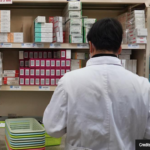Cairo, November 08, 2018:
With only 50% of health facilities functioning across the country and no doctors in 18% of districts in Yemen, we cannot afford for one more health worker to lose their life, or one more hospital to go out of service. In Hudaydah city, the hospitals are closest to the frontlines, which is alarming and is jeopardizing the lives of health care workers and patients alike.
Increased fighting is also affecting the port of Al Hudaydah, through which 85% of the country’s food supplies are normally imported. The people of Yemen are already on the brink of famine, with 1.8 million children under five and 1.1 million pregnant or breastfeeding women acutely malnourished. More than 400,000 severely acutely malnourished children rely on urgent and accessible medical care to stay alive.
As the immune systems of millions of Yemenis fail due to hunger, thousands are dying of malnutrition, cholera and other diseases. People living in Al Hudaydah are some of the worst hit, with the highest rates of cholera reported since the beginning of the outbreak.
WHO supports 269 health facilities in the country. We have established 51 therapeutic feeding centres in 17 governorates to provide life-saving treatment for severely malnourished children with medical complications, and 72 diarrhoeal treatment centres and 25 oral rehydration centres for the treatment of cholera and other diarrhoeal diseases.
The people of Yemen are victims of this tragic, man-made crisis. Many have died due to the violence, some directly but most as the result of restricted access to health care, causing deaths that are normally preventable.
As the conflict rages, I urge all parties to the conflict to respect their legal obligations under International Humanitarian Law to ensure the protection of health workers, patients, health facilities, ambulances and communities, and to facilitate humanitarian access to areas where people need our help the most.







